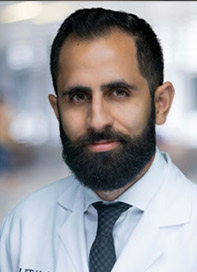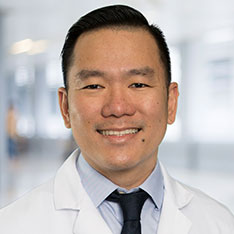If it’s hard to breathe because you have a serious respiratory condition or lung disease, look to University Health experts for top-quality lung transplantation services.
Do You Need a Lung Transplant?
Your lung doctor (pulmonologist) may recommend a transplant if other treatments do not improve serious lung conditions such as:
Cystic Fibrosis
Cystic fibrosis is a genetic condition that affects the lungs and other systems in the body. Lung transplantation may be a treatment option if cystic fibrosis causes advanced damage to the lungs.
Chronic Obstructive Pulmonary Disease (COPD)
A lung transplant may improve the quality of life for a person with COPD. COPD includes conditions like emphysema and chronic bronchitis that damage the lungs and make it hard to breathe. When other treatment options have been exhausted, a lung transplant may be considered.
Interstitial Lung Disease
Interstitial lung disease describes a group of conditions that cause scarring of the lung tissue. As the condition progresses, it makes it harder to breathe. Once the tissue is scarred, it generally can’t be repaired, and lung transplant may be the only treatment option.
Pulmonary Hypertension
Pulmonary hypertension is high blood pressure that constricts the blood vessels in the lungs and heart, making it hard to breathe. There is no cure for this condition, but medications can help relieve symptoms and slow damage to the lungs. Lung transplant may be an option for people with chronic pulmonary hypertension.
Scleroderma
Scleroderma is an autoimmune disease that causes thickening of the skin and tightening of the blood vessels. Over time it can cause irreversible scarring of the lung tissue and high blood pressure, which makes it hard to breathe. A lung transplant may improve quality of life for these patients.
Rheumatoid Arthritis
Rheumatoid arthritis is an autoimmune condition that causes inflammation in the joints. It can also affect the lungs, causing scarring and inflammation. About 10% of people with rheumatoid arthritis will develop interstitial lung disease. If this progresses, a lung transplant may be recommended.
Lymphangioleiomyomatosis (LAM)
LAM is a rare genetic condition that primarily affects people assigned female at birth. It can cause cysts to develop in the lungs, making it hard to breathe. One of the most common complications of LAM is a collapsed lung. If the condition doesn’t respond to other treatments, your doctor may recommend a lung transplant.
Connective Tissue Disease
Connective tissue disease is an umbrella term for conditions that affect your body’s connective tissues that hold your organs in place. Examples of connective tissue disease include rheumatoid arthritis and scleroderma. If connective tissue disease has caused significant lung damage, you may need a lung transplant.
Alpha-1 Antitrypsin (AAT) Deficiency
AAT deficiency is an inherited genetic trait. AAT is a protein made in the liver that protects your lungs. If your body doesn’t naturally produce enough of this protein, it leaves your lungs exposed to damage and disease. People with AAT deficiency may develop emphysema as their lung function deteriorates.
How to Get Transplant Care
Ask for a referral from your lung specialist (pulmonologist) to University Health to explore lung transplantation as a treatment option. Your specialist should check the patient criteria before beginning the referral process. You can also self-refer.
Evaluation Process
Determine if you are eligible for lung transplantation at University Health through an evaluation. Plan for:
- Your first visit to determine if you are sick enough to need a new lung
- Evaluation and testing to find out if you are strong enough to have lung transplantation based on your physical and mental health
- Decision from the transplant team about whether you are a candidate for a lung transplant
Transplant Process
If you are an approved lung transplant candidate, your team will put you on the national waiting list. Your next steps in care will be:
- Maintaining your health, not smoking and preparing yourself mentally while you’re on the lung transplant waiting list for surgery
- Having lung transplant surgery
- Recovering in the hospital after transplant surgery
Expect to get pre- and post-transplant patient education, resources and support services.
Types of Lung Transplantation Procedures
At University Health, you can receive two types of lung transplantation from deceased donors, including:
- Single lung – Transplants one lung
- Double lung – Transplants two lungs
Lung Health
Find complete care and treatment for a broad range of lung diseases and respiratory conditions at University Health. Consult our experienced doctors for a comprehensive approach to managing lung disease before considering lung transplantation.
Why Choose University Health? 
Gain access to world-renowned lung transplantation research and innovation, medical expertise and surgical excellence at University Health. When you work with our transplant team doctors and surgeons and bilingual health care team members, you’ll experience compassionate, patient-centered care and support.
UT Health San Antonio Partnership
In partnership with UT Health San Antonio, our deep expertise, years of experience, devotion to patient-centered care, and dedication to research makes us a leader in lung transplants.
Experience and High-Quality Care
Count on high-quality care and services from the beginning of your care and throughout your life. We’ll respect your wishes while providing excellent specialized care that fits your individual needs. Your treatment integrates the latest transplant research for the best possible care.
Benefit from decades of lung transplantation experience and doctors who are experts in their field. Our skilled lung transplantation team has performed almost 800 lung transplants.
Some of the longest surviving lung transplant patients in the nation had their transplants at University Health.
Center of Excellence
We are recognized as a Center of Excellence for adult lung transplant and medical surgical care by the following health plans and organizations:
- Aetna
- BlueCross BlueShield Association
- LifeTrac
- Optum Health

Short Wait Times, Exceptional Outcomes
Patient success and survival outcomes at our Transplant Institute exceed national expectations, according to the Scientific Registry of Transplant Recipients (SRTR). And our lung recipients have some of the shortest waiting times in the country for transplantation.
Our Lung Transplant Milestones
University Health Transplant Institute milestones in lung transplant care:
- Transplantation of the first lung for the treatment of emphysema in North America
- First heart and double-lung transplant performed in San Antonio
- Transplantation of the first single lung for the treatment of pulmonary hypertension in the world
Why University Health for Lung Transplant
Benefit from decades of lung transplantation experience and doctors who are experts in their field. Our skilled lung transplantation team has performed almost 800 lung transplants since 1987.
Some of the longest surviving lung transplant patients in the nation had their transplants at University Health. We prioritize “pre-habilitation,” or prepping your body for your new lung before the transplant. We know that optimizing your health before your surgery is key to a longer-lasting, more successful transplant. We provide outpatient pulmonary conditioning to support you.
Plus, our lung recipients have some of the shortest waiting times in the country for transplantation.
High-Quality, Recognized Lung Care
We are recognized as a Center of Excellence for adult lung transplant by the following health plans and organizations:
- Aetna
- BlueCross BlueShield Association
- LifeTrac
- Optum Health
Our Lung Transplant Milestones
- Transplantation of the first lung for the treatment of emphysema in North America
- First heart and double-lung transplant performed in San Antonio
Transplantation of the first single lung for the treatment of pulmonary hypertension in the world




